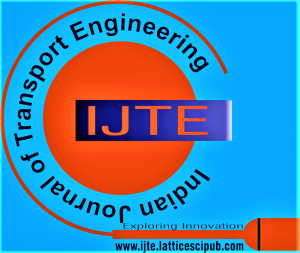![]()
Assessment of Public Acceptance and Compliance with Traffic Congestion Pricing: A Case Study of Ranchi City, India
Rajeev Kumar1, Ajai Singh2
1Rajeev Kumar, Student, Department of Civil Engineering, Central University of Jharkhand, Ranchi, India.
2Prof. Ajai Singh, Professor, Department of Civil Engineering, Central University of Jharkhand, Ranchi, India.
Manuscript received on 26 June 2025 | First Revised Manuscript received on 15 July 2025 | Second Revised Manuscript received on 16 October 2025 | Manuscript Accepted on 15 November 2025 | Manuscript published on 30 November 2025 | PP: 1-9 | Volume-5 Issue-2, November 2025 | Retrieval Number: 100.1/ijte.B191305021125 | DOI: 10.54105/ijte.B1913.05021125
Open Access | Ethics and Policies | Cite | Zenodo | OJS | Indexing and Abstracting
© The Authors. Published by Lattice Science Publication (LSP). This is an open-access article under the CC-BY-NC-ND license (http://creativecommons.org/licenses/by-nc-nd/4.0/)
Abstract: This work evaluates the necessity and efficacy of congestion pricing on the main road in Ranchi city, aiming to provide a detailed roadmap for its implementation and address potential challenges. Extensive data analysis reveals severe traffic congestion, particularly during peak hours, with Passenger Car Units (PCU) peaking at 2,747 and Peak Hour Factors (PHF) reaching 0.97. Economic assessments highlight significant losses resulting from prolonged travel times, increased fuel consumption, and elevated environmental costs associated with emissions. The findings indicate that time loss costs for commuters and businesses are substantial, with heavy motor vehicles incurring up to ₹2.53 per km in time costs and ₹12 per km in fuel costs. Environmental costs are also considerable due to increased CO2 emissions. The proposed congestion pricing strategy includes a charge of ₹50 for heavy vehicles, ₹30 for four-wheelers, ₹20 for three-wheelers, and ₹10 for two-wheelers during peak hours. This strategy aims to optimize traffic flow, reduce delays, and improve air quality. This study highlights the pressing need for effective traffic management solutions to improve urban mobility and economic efficiency in urban areas.
Keywords: Congestion Pricing, Traffic Management, Peak Hour Factor, Passenger Car Units, Urban Mobility, Fuel Consumption, CO2 Emissions.
Scope of the Article: Transport Planning
